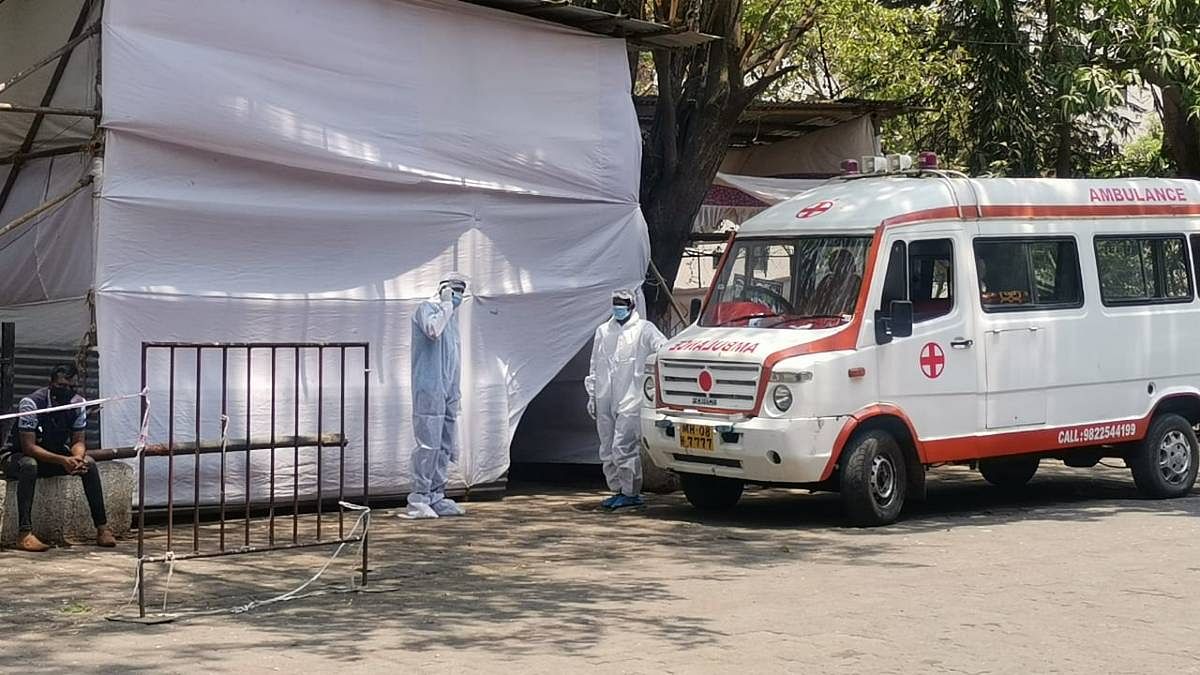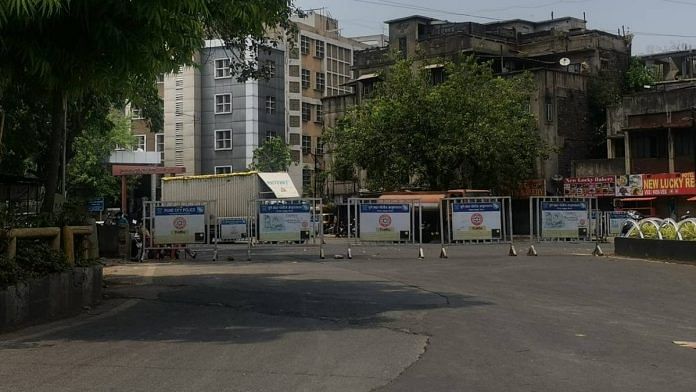Pune: For Pune resident Jyoti Kelkar, finding a bed for her mother who had tested positive for Covid-19, was nothing short of a stroke of luck. Diagnosed early last week, the 71-year-old’s condition had worsened over the next few days. A diabetes patient, her fever had persisted and her oxygen levels dropped.
“Day before yesterday morning [Thursday] when she got up from her bed in the morning, she fainted. Her pulse rate had become very low … From morning, we had been in search of a [hospital] bed, calling all the helpline numbers of all civic bodies,” Kelkar told ThePrint.
She added, “There was no bed, no oxygen bed, no ICU, even the general ward was full, everything was full. It was very very difficult, but we finally found a bed at a nearby hospital at 1.30 am at night … and now [after she has been admitted] we are facing difficulty in sourcing Remdesivir [a drug used to treat Covid patients].”
Jyoti’s story is being echoed by families of Covid-19 patients across Maharashtra. The state is in the grips of arguably the worst surge in Covid-19 cases yet. The state reported 63,294 new cases and 349 deaths Sunday.
From a paucity of beds to a shortage of Remdesivir doses and an overwhelming lag in getting test results, the drastic surge in Covid cases in the state has left doctors, hospitals and the local administration scrambling to tend to patients.
Also read: Maharashtra Covid task force feels ‘lockdown is required’, but decision only after 14 April
Paucity of beds
In Mumbai, 89 of 2,529 ICU beds and 32 of 1,302 ventilator beds are available across dedicated Covid health centres (DCHC) and dedicated Covid hospitals (DCH). Bed occupancy is currently at 79.5 per cent.
In Pune, of the total 22,316 beds allotted for Covid-19, about 17.2 per cent of beds are currently available, which include 33 ventilator beds and 216 ICU beds (those without ventilator facility).
Nagpur is reported to be the worst affected, with around 4.4 per cent available beds.
The mad rush for beds has led to civic bodies across cities ramping up their efforts to help patients. For instance, in Pune, patients can look up the availability of an isolation bed, isolation bed with oxygen, ICU bed without ventilator and ICU bed with ventilator, using a dashboard set up by the Pune Municipal Corporation (PMC). They can then reach out to helpline numbers set up by the local civic bodies.
Similarly in Mumbai, the Municipal Corporation of Greater Mumbai (MCGM) has set up 24 ward war rooms to assist in the allotment of beds.
Doctors, however, said that despite the local administration’s efforts, patients are facing difficulties in accessing beds.
Dr Prachee Sathe, an intensivist at Pune’s Ruby Hall Clinic said, “It is horrible. My phone is ringing incessantly and for all types of beds, ventilator beds, oxygen beds, non-oxygen beds, everything. They continuously want beds, but beds aren’t available and people are all over the place searching for beds. There is a portal but I don’t think people are getting assistance through this.”
Some of the rush is owing to patients and their families panicking.
Dr Sameer Jog, consultant intensivist at the Deenanath Mangeshkar Hospital told ThePrint, “We are really under pressure to admit more and more [patients] … many patients with mild symptoms are getting admitted in hospitals since they have medical insurance and don’t want to stay at home because they and their relatives are panicking. Many private hospitals are facing this issue.”

ThePrint also spoke to a doctor based in Pune, who narrated the harrowing ordeal her family in Mumbai faced while trying to get her father-in-law, a suspected Covid patient, admitted to a hospital.
As his condition worsened, the 71-year-old was admitted to a hospital Saturday morning “with quite some difficulty”. The family couldn’t, however, get an ICU bed for him. He was given a general ward bed with oxygen support.
“Meanwhile, I was constantly calling up MCGM, filling up his information online [looking for ICU beds], while also looking for Remdesivir injections. I called up more than eight hospitals between Kandivali and Victoria Terminus, but there was nothing available,” the Pune doctor, who didn’t wish to be named, said.
It wasn’t till Sunday that the 71-year-old was admitted to a hospital with an ICU bed. “He’s critical now and has been put on non-invasive ventilation. It looks more like a cardiac failure, many of his organs are compromised, but I don’t know whether this is because of delay in getting admitted or whether it is because of the impact of Covid on a patient with comorbidities… I pray that no one has to go through this,” she said.
Also read: Reasons behind Maharashtra’s disastrous Covid showing dragging the India story down
Lag in testing
According to the Pune doctor quoted above, her father-in-law’s Reverse Transcription Polymerase Chain Reaction (RT-PCR) test, to check Covid infection, took as many as five days to process.
“When we got the report, the RT-PCR turned out to be negative, although the CT scan indicated that it could be Covid because the lungs had been affected. This led to a lot of confusion in the allotment of beds,” she added.
People across Mumbai and Pune have also taken to Twitter to post about the lag in the Covid-19 testing service.
“Been trying to get an RT PCR test all morning to take a flight to Mumbai, for reporting on the ground, none available, first-hand testimony to overstretched, heaving system. Still at it but testing needs as much attention as vaccination,” journalist Barkha Dutt tweeted Monday.
Another Twitter user, Anand Teke, also wrote, “Visited top 4 laboratories in Pune for Covid test. None doing rapid antigen tests and all having waiting periods of 2-3 days for RTPCR”.
A doctor at a prominent clinic and diagnostics centre in Pune told ThePrint that since last month, the demand for RT-PCR tests have increased by 400-500 per cent.
“20 per cent of them are coming because they’re symptomatic, five per cent are cases of contact tracing by family members. The rest of the 75 per cent are those who are looking to get a negative report as mandated for work or travel … Currently, there’s a lag of 48 hours,” he said.
ThePrint also reached Dr Lal PathLabs over email, but there was no response till the time of publishing this report.
Several states have made it mandatory for passengers travelling out of Maharashtra to carry a negative RT-PCR test report. The Maharashtra government has also mandated that non-vaccinated staff working across sectors get RT-PCR tests done at an interval of 15 days, till they are vaccinated. Later, after industry bodies protested against the order, it was rectified to allow for testing using Rapid Antigen Tests.
Also read: Maharashtra’s Covid situation ‘grim’, Centre has assured help, says Sharad Pawar
‘We should’ve been prepared’
The local administration in Pune and Mumbai said that they’re in the process of adding more beds and opening (in some cases re-opening) jumbo hospitals — large, makeshift Covid treatment facilities that were opened last year in Pune and Mumbai during the first surge in cases in September. The facilities were subsequently closed after the cities saw a decline in cases.
“We will be converting more and more non-Covid beds to Covid beds. Smaller hospitals, which were earlier not included in the list of places providing Covid treatment will also be roped in now,” said Pune Municipal Corporation Commissioner Vikram Kumar.
Meanwhile, the MCGM Commissioner Iqbal Singh Chahal, in an update shared with reporters over WhatsApp, said that the corporation will operationalise 1,100 additional beds in dedicated Covid health centres and dedicated Covid hospitals and build three jumbo hospitals in the next five to six weeks. “All labs have been instructed to ensure a turnaround time of 24 hours without fail,” Chahal said.
Some in the medical fraternity feel, however, that the authorities should have been better prepared to handle the latest Covid wave in the state.
Dr Deepak Baid, president of the Association of Medical Consultants, Mumbai, said, “Hospital infrastructures should have been improved sooner. If there is an ICU with seven to nine beds today, it should have been made into a 27-bedded ICU by now. It was possible to do it in the past one year that we have been fighting Covid … this situation could have been avoided.”
Dr Avinash Bhondwe, the immediate past president of the Maharashtra chapter of the Indian Medical Association, agreed.
“They had shut the jumbo hospitals set up across the state. Now that the number of those infected is going up, they’ve started opening more such facilities …,” he said. “The decision to shut down was an administrative decision. They should have used the facility for other types of patients, such as for out patient departments (OPD) that do not have a place in proper hospitals, but that wasn’t done either.”
(Edited by Poulomi Banerjee)
Also read: 80% of military, central security forces have got first shot, but police in top Covid states lag




From starting our nation didn’t care much about health policies and even we people also didn’t care about it. Now we are paying the price for this . Now also govt is not forcing private hospitals to provide treatment at reasonable rates.